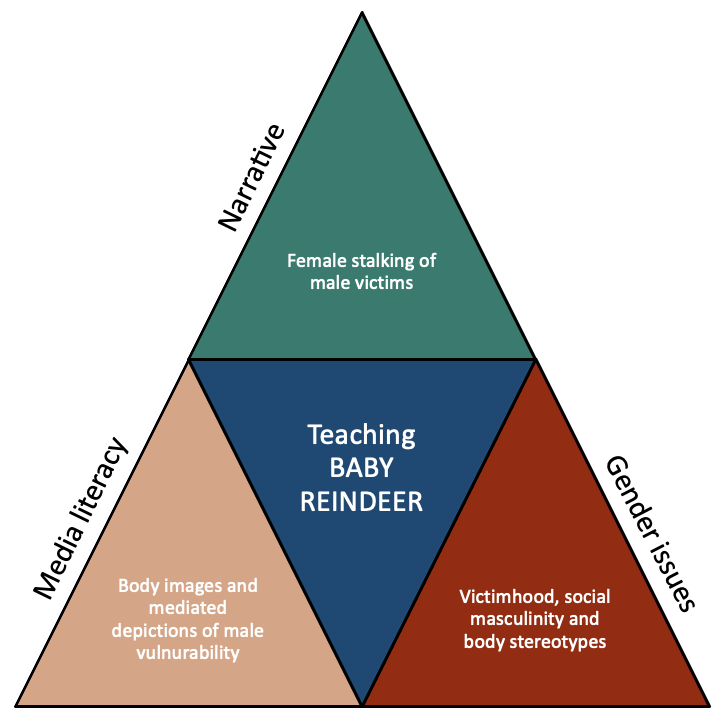Baby Reindeer and male vulnerability
The nature of a sequence #4
By Silvia Fanti, 13 June 2024
The recent Netflix series Baby Reindeer (2024-) is not just a series; it’s a catalyst for critical discussions on identity, power, societal norms, and particularly gender issues. This blog post explores the intricate character development and nuanced relationship dynamics in the series, which have sparked profound conversations and self-reflection.
The semi-autobiographical nature of the series lends authenticity to the narrative, making it engaging and relatable. The unexpected revelation of protagonist Donny’s past abuse adds depth to the plot and challenges the oversimplified labels of ‘victim’ and ‘perpetrator’. The series delves into the complex dynamics of relationships and explores the interplay between sexuality, power, personal desire, and societal conditioning. It represents a significant stride towards a more comprehensive understanding of gender violence and societal pressures, underscoring the influential role of media in fostering critical dialogues and advocating for societal transformation. In essence, Baby Reindeer serves as a mirror to societal biases and a tool for introspection, transcending mere entertainment to become a valuable resource for critical discussions.
Real events about the stalking of men
Baby Reindeer is a compelling comedy-drama series based on actual incidents. The series dives deep into the distressing experiences of its lead character, Donny Dunn. As an aspiring comedian and disheartened bartender, Donny lives with his ex-girlfriend’s mother, steeped in remorse. When Martha (Jessica Gunning), a seemingly downcast individual, visits his bar one day, he empathizes with her, seeing a kindred spirit deserving of kindness. However, Martha is more than just a pitiful figure; she is a convicted stalker. She soon inundates Donny with hundreds of daily emails, harasses his family and ex-partners, and appears uninvited at his performances and home. It’s unyielding, it’s horrifying, and oddly… flattering?
Baby Reindeer has captivated audiences with its candid portrayal of male sexual victimization, stalking, and substance abuse. It highlights the significant role of popular culture in stimulating thought-provoking discussions around such delicate topics. What distinguishes filmmaker Gadd’s work is its spotlight on the frequently overlooked experiences of sexual violence endured by men, both in popular culture and in reality. While it’s essential and understandable that dialogues about sexual assault and its solutions often give precedence to the female perspective, “Baby Reindeer challenges this convention. As one of the most viewed shows on Netflix, it offers a vivid and powerful examination of the psychological effects of stalking and sexual victimization on Donny.

Donny’s interactions with Martha, the female stalker, lead him on a distressing journey of vulnerability and mistrust. The series provides a realistic depiction of the distress associated with stalking. Donny’s experiences offer insights into consent, victimization, and the societal pressures on men to conform to traditional masculinity norms, which often influence their responses to abuse. For instance, as Martha’s stalking begins, we see Donny participating in often sexual jokes about his relationship with Martha, who frequents his workplace daily to interact with him. Despite escalating anxiety about her and the increasingly sexual tone of her persistent emails, he feels pressured to maintain a “one of the guys” persona in front of his colleagues. In this context, one of the most impactful scenes is when Donny confronts Martha, his stalker. This confrontation unveils the complexities of their relationship and challenges the audience’s preconceived ideas about victimhood and perpetration.
Reversing gender power dynamics
In the second episode of Baby Reindeer, the narrative takes a significant turn when Donny, the protagonist, openly rejects Martha for the first time. This pivotal moment in the series marks a shift in their relationship dynamics and sets the stage for the escalating tension and conflict that unfold in the subsequent episodes.
From the outset, the episode presents Donny in a state of internal conflict. He contemplates whether to unfriend Martha, but his indecisiveness underscores his struggle to navigate his complex feelings towards Martha and the situation he finds himself in. As Martha’s continuous harassment becomes a source of distress for Donny, he feels compelled to take action. In a decisive move, he tells his colleagues that they need to bar Martha, asserting his boundaries and taking control of the situation.
Donny’s decision to sever ties with Martha completely is not taken lightly. It signifies his realization of the severity of Martha’s actions and his determination to protect himself. This scene is crucial as it showcases Donny’s growing discomfort and fear. His decision to reject Martha is a clear indication of a shift in the dynamics of their relationship.
This episode serves as a turning point in the series, not only changing the course of Donny and Martha’s relationship but also deepening the exploration of themes such as obsession, boundaries, and personal agency. It underscores the series’ commitment to portraying the complexities of such situations with sensitivity and nuance.
The confrontation between Donny and Martha is impactful as it challenges preconceived notions, reveals character complexities, and advances the narrative in a significant way. It marks a reversal of power dynamics, with Donny, who has been the victim of Martha’s stalking, taking control of the situation. This shift challenges the audience’s understanding and stereotypes of victimhood and perpetration.
The confrontation also unveils the complexities of Donny and Martha’s relationship, showing that it isn’t just black and white, but involves a range of emotions and motivations that add depth to their characters. It challenges societal stereotypes about stalking, victimhood, and masculinity, showing that men can also be victims of stalking and that they often struggle with societal expectations when dealing with such situations.
The emotionally charged confrontation scene brings to the forefront the psychological impact of stalking on the victim, helping the audience empathize with Donny’s situation and understand the severity of Martha’s actions. The confrontation propels the narrative forward, leading to significant developments in the storyline and the characters’ arcs. Therefore, this episode stands as a testament to the series’ ability to spark critical discussions on important societal issues.
Pedagogical use of Baby Reindeer in high school teaching
As GEMINI is committed to creating educational resources for high schools across Europe and beyond, the confrontation scene in Baby Reindeer between Donny and his stalker Martha (as well as the series as a whole) offer numerous opportunities for critical discussions and debates in the classroom, focusing on media literacy and gender issues.

Victimhood and perpetration
The scene challenges conventional ideas of victimhood and perpetration, particularly within a gender context. In general, the series disrupts the traditional binary labels of ‘victim’ and ‘perpetrator’ through complex character development and intricate relationship dynamics. In the conventional sense, a victim is typically perceived as someone who suffers harm or injury because of the actions of another, while a perpetrator is seen as the one causing the harm or injury. However, Baby Reindeer disrupts this simplistic understanding by presenting characters that defy these labels.
Donny, the protagonist and victim of stalking, is portrayed as neither entirely helpless nor passive. His reactions to the stalking, including his decision to confront Martha in this scene, reflect societal pressures on men to adhere to traditional masculinity norms. Martha, the stalker, is not a one-dimensional villain. Her actions, harmful and unacceptable, stem from her own struggles and obsessions. This nuanced portrayal encourages viewers to question their preconceived notions and biases, highlighting that anyone, regardless of their gender, can be a victim or a perpetrator, and these roles can be complex and multifaceted. Baby Reindeer offers a fresh perspective on the theme of victimhood and perpetration, encouraging viewers to engage in critical thinking and challenging societal stereotypes.
Societal expectations and masculinity
The scene is one of the most significant in Baby Reindeer because it reflects Donny’s response to being stalked by Martha, and his eventual decision to confront her are heavily influenced by societal expectations of masculinity. Society often expects men to be strong, assertive, and unemotional. These expectations can influence how men respond to situations, especially those involving conflict or threat. In Donny’s case, these societal expectations might have influenced his decision to confront Martha. Confrontation is often seen as a display of strength and assertiveness, traits typically associated with masculinity. By choosing to confront Martha, Donny could be seen as adhering to these societal expectations of masculinity.
However, this decision also reveals the complexities of masculinity. While Donny’s confrontation could be seen as a display of strength, it also exposes his vulnerability. This vulnerability challenges the traditional notion of masculinity as being devoid of emotion or weakness. Furthermore, Donny’s response to Martha’s stalking – his initial reluctance to report her, his attempts to handle the situation on his own, his struggle with feelings of fear and helplessness – can all be seen as influenced by societal expectations of masculinity. These expectations can discourage men from seeking help or expressing emotions, often leading them to deal with such situations in isolation. In conclusion, Donny’s response to Martha’s stalking and his decision to confront her provide a rich context for discussing societal expectations of masculinity and their influence on men’s reactions to such situations. It highlights the need for a broader understanding of masculinity, one that acknowledges men’s vulnerabilities and emotions, and challenges traditional gender norms.

Body image and stereotypes
The decision to depict Martha as plus-sized and the stereotypes associated with her character can lead to discussions about body image, fatphobia, and societal expectations. Students can debate whether Martha’s portrayal is a shortcut to create a certain type of character and how changing her appearance might affect the dynamics of the series. Should the decision to portray Martha as plus-sized be challenged? It seems like a shortcut to create a character designed to repel and alienate the audience.
The writing heavily leans on stereotypical fatphobic narratives: Martha is not only plus-sized but also clumsy, greedy, messy, dirty, vulgar, excessive, and intrusive – a monster. Would the perception change if Martha had a conventionally attractive body, fitting a standard beauty model? While the narrative instrumentalization of a minority body is criticized, students may also debate if a more ‘acceptable’ and likable stalker would simplify the relational dynamics between Martha and Donny, making his attachment to her seem more understandable and almost expected. The series makes it clear that Donny’s attachment isn’t about physical attraction but rather his own vulnerabilities and insecurities. Despite recognizing the severity of the situation, Donny struggles to let go of the special attention that makes him feel unique and desired. Shouldn’t the assumption that Donny’s attachment isn’t about Martha’s looks and that her body is undesirable also be questioned?
Baby Reindeer as complex edutainment
Baby Reindeer is a unique educational resource that presents complex themes and narratives, engaging viewers in critical thinking and introspection. It explores multifaceted issues such as victimhood, perpetration, societal expectations, masculinity, and body image stereotypes. The series challenges societal norms and disrupts traditional labels of ‘victim’ and ‘perpetrator’, presenting characters with depth and complexity. It highlights the often-overlooked experiences of male victims of stalking and the societal pressures they face. Baby Reindeer actively engages its audience, transforming them from passive consumers into active participants in the learning process. It stimulates critical thinking by presenting narratives that defy easy categorization, encouraging viewers to grapple with ambiguity and complexity.
In conclusion, Baby Reindeer serves as a powerful example of how media can be leveraged as an educational tool. It demonstrates how popular culture can spark critical discussions, foster empathy, and promote understanding of complex societal issues. It serves as a valuable resource for educators seeking to engage students in critical discussions about complex societal issues. It challenges gender stereotypes by presenting a male victim of stalking, marking a significant step towards a broader understanding of gender violence. Baby Reindeer is an exemplary piece of “edutainment” that underscores the power of popular culture to challenge dominant beliefs and facilitate a deeper understanding of the diverse struggles faced by those enduring painful experiences.
Watch the full sequence from Baby Reindeer through the GEMINI Facebook page.



